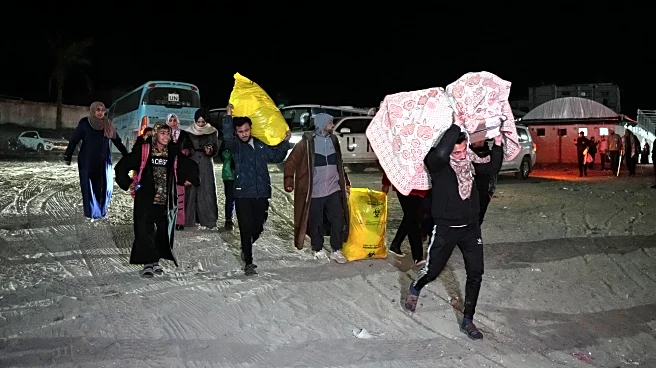What's Happening?
The 30th annual United Nations climate summit, known as COP30, is taking place in Belem, Brazil, at the gateway of the Amazon rainforest. The summit aims to bring together world leaders, activists, and experts to address the escalating effects of human-caused
climate change. Brazil is highlighting the role of Indigenous peoples and land stewardship in combating climate change. The government has introduced the Tropical Forests Forever Facility, a program offering monetary rewards to nations for forest protection. Despite logistical concerns about hosting tens of thousands of attendees, Brazil insists on showcasing the vulnerability of poorer communities to climate-related disasters.
Why It's Important?
COP30 is crucial as it underscores the urgent need for global cooperation to mitigate climate change impacts. The summit's location in Belem emphasizes the importance of preserving the Amazon rainforest, a critical ecosystem in regulating global climate. The initiative to financially incentivize forest protection could drive significant environmental policy changes. However, the absence of ambitious new agreements and the U.S.'s non-participation in submitting updated climate plans highlight challenges in achieving substantial progress. The summit serves as a reminder of the disparities between rich and poor nations in addressing climate change.
What's Next?
The focus of COP30 is on implementation rather than new agreements, with countries expected to enhance efforts and funding for climate adaptation and prevention of deforestation. The success of the summit will depend on increased financial commitments from wealthy nations to support vulnerable communities. The outcome may influence future climate policies and international cooperation. Critics argue that the summit risks becoming a bureaucratic exercise without tangible results, emphasizing the need for concrete actions beyond discussions.
Beyond the Headlines
The ethical dimension of COP30 involves addressing the disproportionate impact of climate change on poorer communities, highlighting the need for equitable solutions. The summit may catalyze long-term shifts in global environmental policies, particularly in forest conservation and sustainable land use. The emphasis on Indigenous knowledge and practices could lead to broader recognition of their role in climate resilience.














